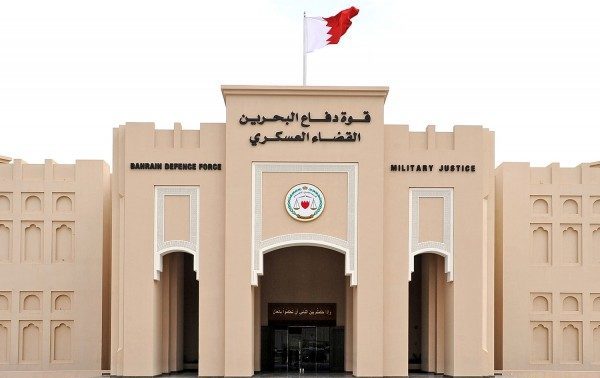The Bahraini government announced on 31 January 2018 that the Military High Court of Appeal has yet again postponed the case of 13 men convicted by the Military High Court on 25 December 2017. After appeal hearings on 10, 14, and 31 January, the case is now adjourned to 21 February, when the court is expected to issue its verdict. The case – Terror Case/2017/1 – marks the first trial of civilians before a military court in Bahrain since the 2011 National Safety Courts, following King Hamad’s April 2017 decision to amend the constitution and expand the jurisdiction of the military judiciary. The use of military courts to try civilians violates international fair trial standards and the government must immediately vacate these sentences and restore the constitutional prohibition on such trials. Any further legal proceedings must occur in civilian courts and abide by all fair trial norms.
On 25 December 2017, the Bahraini Military High Court Bahrain tried 18 men (17 civilians and one soldier) on charges of forming a terrorist cell and plotting to assassinate the commander of the Bahrain Defence Force (BDF), Bahrain’s military. The court sentenced six men – Mubarak Adel Mubarak Mahanna (the only soldier), Sayed Fadhel Abbas Hassan Radhi, Sayed Alawi Sayed Husain Alawi, Mohammed Abdulhassan Al Mutaghwi, Murtada Majeed Ramadan Alawi, and Habeeb Abdullah Hassan Ali – to death and seven men to seven years’ imprisonment. It acquitted five of the defendants. The 13 men who were convicted were also stripped of their nationality.
For the first time since the king removed the constitutional prohibition on military trials for civilians, the BDF’s military judiciary conducted the proceedings and ultimately convicted the defendants. Similar security tribunals – known as National Safety Courts (NSC), in reference to the State of National Safety declared by the king – were established to hear cases arising out of the 2011 pro-democracy protests. The NSC were noted for due process violations, a lack of transparency, and judicial irregularities, including the acceptance of forced testimony extracted through torture. After the 2011 protests, the government disbanded the NSC, and Bahrain’s constitution continued to prohibit military trials of civilians unless the king declared a state of emergency. However, on 3 April 2017, Bahrain’s king amended the constitution to grant the standard BDF military judiciary the power to try civilians in cases deemed to impact national security, even under ordinary circumstances without a State of National Safety or Martial law ever being formally declared. The constitutional amendment effectively renders the emergency measure of NSC trials a normal part of the justice system in Bahrain, and directly incorporates the military further into civilian governance.
The use of military courts to try civilians is in violation of the fair trial rights enshrined in both the Universal Declaration of Human Rights (Article 10) and the International Covenant for Civil and Political Rights (Article 14). In addition, it contravenes the spirit of the Bahrain Independent Commission of Inquiry recommendations, which stated in Recommendation 1720 that “fundamental principles of a fair trial, including prompt and full access to legal counsel and inadmissibility of coerced testimony, were not respected” in the NSC, and that the cases should be subject to civilian review. The government’s actions also explicitly violate recommendations that Bahrain accepted as part of its United Nations Universal Periodic Review, which variably called on the authorities to ensure that civilians are never again tried in military courts.
Aggravating the use of a military court, both the initial and appeal proceedings have been rife with other due process and human rights violations. Several defendants report that officials tortured them to extract confessions, and some – like Sayed Alawi and Sayed Fadhel – were subjected to enforced disappearance. Eight defendants were convicted in absentia, as they had reportedly fled to Iraq and Iran, and at least two were minors at the time of the alleged offense or arrest. The court additionally “issued a decision banning the publication of any information, data or news by any audio-visual, electronic or written media.” In the initial trial, the authorities prevented some defendants did from meeting with a lawyer until the third hearing in November 2017, and the court has rejected the defense’s request to re-examine suspects and question anonymous witnesses during the appeal. On the 31 January appeal hearing, sources report that the defendants were not allowed to speak, despite prior assurances from the judge.
The Government of Bahrain’s use of military courts to try civilians violates international law. It must therefore void the verdicts, restore constitutional prohibition, and release the detainees. The government must further cease its imposition of punitive denaturalization and institute an immediate moratorium on the death penalty with a view toward abolishing capital punishment. Finally, Bahrain’s leading military partners – like the United States and the United Kingdom – must suspend security assistance and cooperation with the BDF until such time as it is stripped of its power to try civilians in its military courts.





